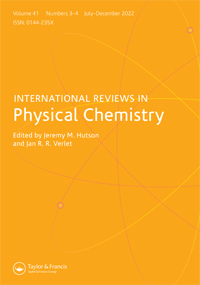Excitation energy transfer in artificial antennas: from photoactive materials to molecular assemblies
IF 2.5
2区 化学
Q3 CHEMISTRY, PHYSICAL
引用次数: 21
Abstract
The development of nanometrically templated artificial light harvesting antennas and energy transfer devices is a highly active area with outstanding challenges. The herein presented review deals with the design of photoactive nanomaterials and multichromophoric arrays looking towards the development of artificial antenna systems. In particular we have focused in the conditions which rule the excitation energy transfer processes in each case. To this aim, a wide variety of luminescent fluorophores encapsulated into either inorganic or organic hosts, as well as molecular systems based on scaffolding of suitable laser dyes have been deeply studied. The main goal is to design systems which harvest the light over a broad spectral region (in particular the ultraviolet-visible section of the electromagnetic spectrum) and transfer it to the target place and with a desired energy (especially in the red edge of the visible) via successive energy transfer hops. To this purpose, three different approaches have been considered to develop optical antennas: (i) hybrid materials based on LTL zeolite aluminosilicate doped with laser dyes absorbing and emitting in different regions of the visible (blue, green or red); (ii) dye-doped latex nanoparticles, in which luminescent fluorophores undergoing intermolecular energy transfer processes are encapsulated; (iii) molecular antennas based on donor and acceptor dyes covalently linked through a spacer. These luminescent antennas have been designed for photonic purposes such as tunable dye lasers, light modulators or polarity probes.人工天线中的激发能转移:从光活性材料到分子组件
纳米模板人工光收集天线和能量传输装置的开发是一个非常活跃的领域,具有突出的挑战。本文综述了光活性纳米材料和多色阵列的设计,展望了人工天线系统的发展。我们特别关注了每种情况下激发能传递过程的条件。为此,人们深入研究了各种封装在无机或有机宿主中的发光荧光团,以及基于合适的激光染料支架的分子系统。主要目标是设计一种系统,该系统可以在广谱区(特别是电磁波谱的紫外-可见部分)收集光,并通过连续的能量转移跳跃将其转移到目标位置并具有所需的能量(特别是在可见的红色边缘)。为此,考虑了三种不同的方法来开发光学天线:(i)基于LTL沸石铝硅酸盐掺杂激光染料的混合材料,在可见光的不同区域(蓝色,绿色或红色)吸收和发射;(ii)染料掺杂乳胶纳米颗粒,其中封装了经历分子间能量转移过程的发光荧光团;(iii)基于供体和受体染料共价通过间隔连接的分子天线。这些发光天线被设计用于光子目的,如可调谐染料激光器、光调制器或极性探针。
本文章由计算机程序翻译,如有差异,请以英文原文为准。
求助全文
约1分钟内获得全文
求助全文
来源期刊
CiteScore
14.20
自引率
1.60%
发文量
5
审稿时长
1 months
期刊介绍:
International Reviews in Physical Chemistry publishes review articles describing frontier research areas in physical chemistry. Internationally renowned scientists describe their own research in the wider context of the field. The articles are of interest not only to specialists but also to those wishing to read general and authoritative accounts of recent developments in physical chemistry, chemical physics and theoretical chemistry. The journal appeals to research workers, lecturers and research students alike.

 求助内容:
求助内容: 应助结果提醒方式:
应助结果提醒方式:


